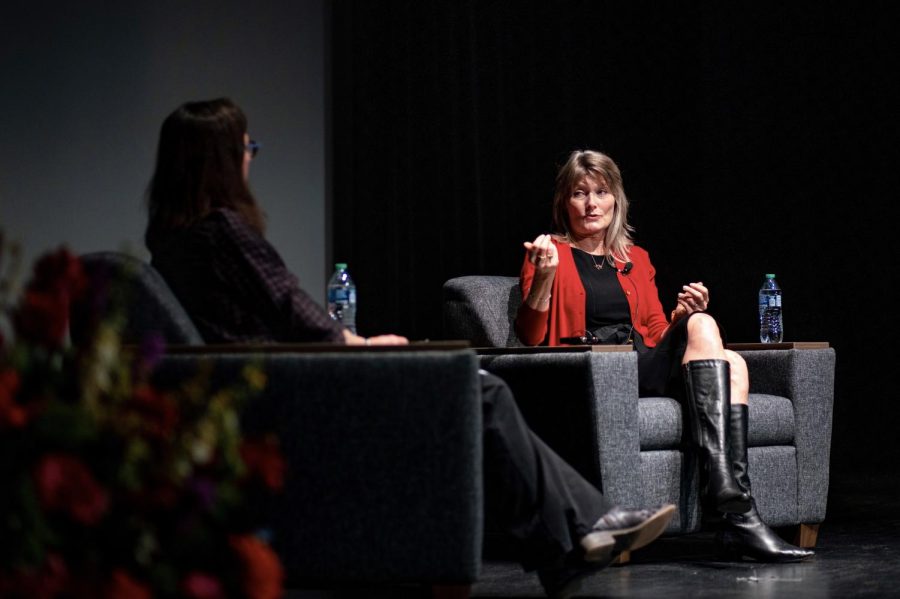As adolescents, we learn the rules of writing. Then, as adults, we learn that sometimes the best books result from breaking them.
Jennifer Egan is a perfect example of what happens when writers experiment with language, plot and setting. Her genre-bending, time-defying books have received critical acclaim and worked their way into the hearts of many readers.
On April 13, Egan spoke with creative writing professor Julie Schumacher at Coffman Union Theater for one of the English department’s biannual Esther Freier Lectures in Literature. These free readings began in 2001 and have featured notable authors such as Zadie Smith, Maggie Nelson and Nicola Yoon.
Egan read from her newest book, “The Candy House,” an exhilarating story about the frightening interconnectedness of our digital age. The book — published April 5 — serves as a companion to “A Visit From the Goon Squad,” which won the 2011 Pulitzer Prize for fiction.
In “The Candy House,” an entrepreneur creates a new technology that allows people to access all of their memories and exchange them with each other. Readers are introduced to a range of characters who discover the consequences of externalizing memories while searching for genuine human connections.
The book revisits themes, characters and structures from “A Visit From the Goon Squad,” but, like most of Egan’s work, can easily work as a standalone story. The chapters within her books each contain multiple short narratives written in unique styles or perspectives.
Some of Egan’s experimental takes on fiction writing include chapters composed of PowerPoint slides or tweets inserted into a book to help convey a virtual reality. Egan notes that these structures would be difficult to sustain for an entire novel, hence her reasoning for the diversity of writing styles throughout a singular book.
“Working in these shorter units is a fun way to get to try lots of different things,” Egan said. “I’m always looking for ways out of linearity.”
Though she has been a published author for more than 25 years, Egan still hesitates to categorize her work as any particular genre. Both “A Visit From the Goon Squad” and “The Candy House” are somewhere in between novel and short story collection, but she doesn’t like to classify them as either.
“I see genre as an opportunity and a possibility, but I like to move among genres because I enjoy the feeling of doing something I haven’t done before and being surprised by what happens,” Egan said.
Even though the content of her books jumps around between style and narrative, there is a string running through each chapter, intertwining them to create a grandiose story spanning across different places and time periods. Characters are vaguely connected to each other or one chapter is built on by the next. Everything comes together like pieces of a puzzle.
As for the process of creating these puzzles, Egan explained that she often starts writing with only a specific setting in mind, and then lets the rest of the chapter unfold from there.
“Time and place is my portal into fiction,” Egan said.
Egan said she does everything she can to completely submerge herself into the story as she creates these fictional worlds. “I try to get outside of my conscious mind,” she said.
To do this, she said she doubles down and gets close to the narrative by writing by hand rather than on a computer. This sounds like a recipe for a cramped hand, but Egan said she swears by it because it discourages her from immediately rereading and judging what she has just written. It also allows her to work on her stories anywhere: on the bus, on a bench or in bed.
Egan said she compares her writing process to the improvisation of actors or musicians.
“You can’t stop and revise, you just keep going and look for a sort of line or action or possibility that feels alive and push into that,” Egan said. “What I’m trying to do is surprise myself with material I wouldn’t have thought of consciously.”
At the end of the evening, Egan expressed gratitude for those who funded the event and made it possible for audience members to attend for free. After completing her PEN America presidency in 2020, she sees the importance of making these readings accessible all across the country.
“It’s harder and harder to find free literary events and I think that [this is] really really valuable,” Egan said. “I love being a part of it.”














